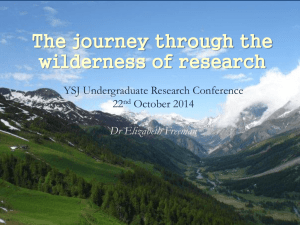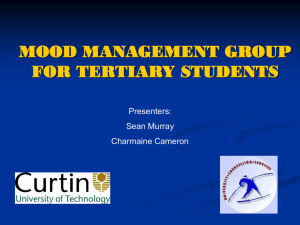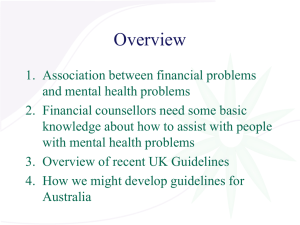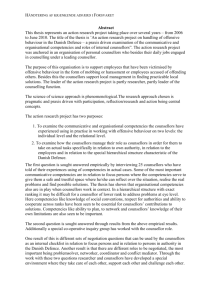Career Guide for Schools News Letter
advertisement
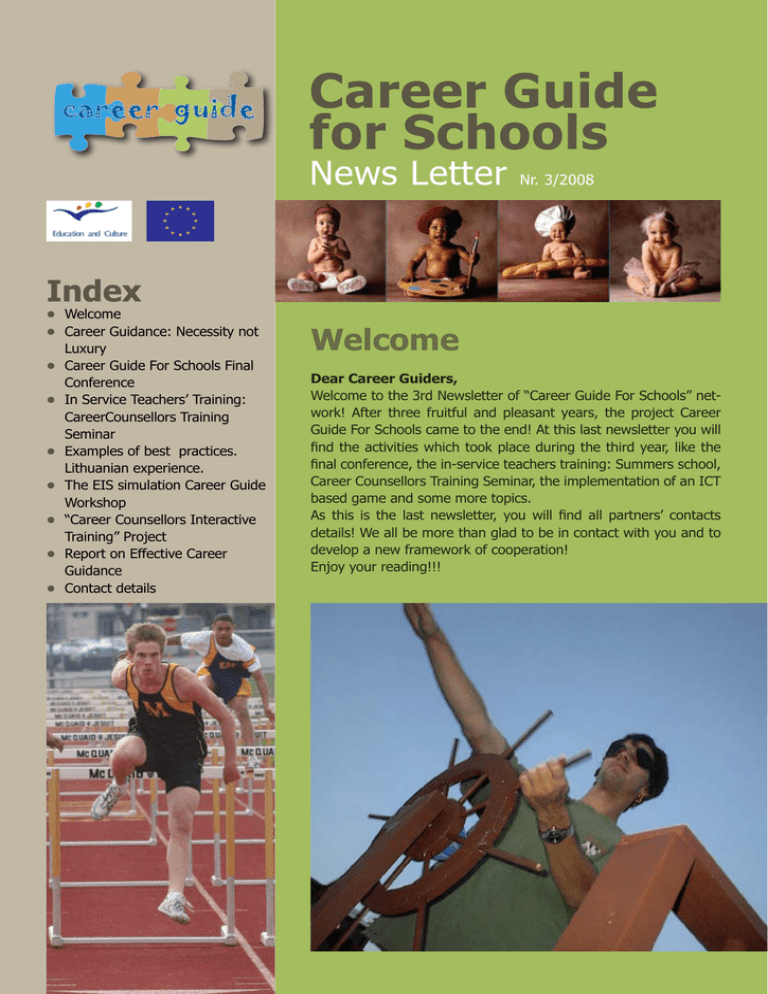
Career Guide for Schools News Letter Nr. 3/2008 Index • • • • • • • • • Welcome Career Guidance: Necessity not Luxury Career Guide For Schools Final Conference In Service Teachers’ Training: CareerCounsellors Training Seminar Examples of best practices. Lithuanian experience. The EIS simulation Career Guide Workshop “Career Counsellors Interactive Training” Project Report on Effective Career Guidance Contact details Welcome Dear Career Guiders, Welcome to the 3rd Newsletter of “Career Guide For Schools” network! After three fruitful and pleasant years, the project Career Guide For Schools came to the end! At this last newsletter you will find the activities which took place during the third year, like the final conference, the in-service teachers training: Summers school, Career Counsellors Training Seminar, the implementation of an ICT based game and some more topics. As this is the last newsletter, you will find all partners’ contacts details! We all be more than glad to be in contact with you and to develop a new framework of cooperation! Enjoy your reading!!! Career Guidance: Necessity not Luxury The ‘new era’ of information and knowledge which is characterized by unexpected and rapid changes in technology and in the labour market often shocks individuals who feel lost and vulnerable in the midst of the flux created around them causing insecurity and anxiety. McLuhan (1994) has already suggested that we live in ‘an anxiety era’, whereas Giddens (2001) uses the term ‘manufactured uncertainty’, which has been developed in the last four decades and needs to be analyzed in the context of globalization. In this context, that is, in the process of connecting the local with the global, through the new methods and channels of communication, new forms of uncertainty and risk are emerging and anxiety is intensified. Rapid changes in multiple contexts (educational, socioeconomic, cultural) often invalidate predictions and ‘investments’ one makes for one’s future and cause disappointment, insecurity and anxiety about the uncertainty which seems to be a dominant characteristic of today’s world. Giddens (ibid) supports the argument that globalisation creates new forms of uncertainty and new kinds of social stratification. The sense of uncertainty can be even more intense in ‘fateful moments’. The uncertainty to which we referred above increases because of the emergence of post traditional forms of organization. Detraditionalisation implies new forms of management and power which need to be analyzed in new ways. Forms of power and authority, such as governments or teams of management, are de-centred and increasingly become dependent on a broader system of power which is exercised by multiple sources. This phenomenon increases the insecurity individuals feel as they realize that the decisions of their country depend on other centres of power in the context of European unification and globalization, despite intense resistance to this phenomenon. We support the view that uncertainty cannot be faced with traditional approaches and methods without our own involvement and critical approach to things and the world: both the external as well as our own internal world. Its facing also requires a kind of knowledge that can give us a sense of security in our wandering about in the realms of an unpredictable world. It is not coincidental that nowadays (e.g. Lisbon Strategy) it is emphasised that we need ‘knowledge’ and not merely information. For us, this is the kind knowledge that can support us to take the ‘risk’ needed for flexi- ble and creative orientations. Therefore, an important issue is to define the kind of knowledge required for facing uncertainty with responsibility and studying our processes in a way that can help us survive in a world that often appears to be chaotic. Career Guide For Schools Final Conference The Final Conference of Career Guide For Schools network took place in Rhodes island at 6th of July 2008. The conference was organized in the framework of the summer schools” Career Counsellors Interactive Training seminar and the “Career Counsellors’ Interactive Training” project. About 70 career counsellors participated from different countries through Europe. The title of the conference was “Career Guidance in Europe” and the main issues concerned the educational systems for career guidance in different countries, some different approaches in career guidance and the presentation of the updated research for the demands of the labour market in Greece. The fifteen career counsellors who participated at the summer schools attended the conference with the rest of the participants and gave a European dimension at the discussions. The main topics of the conference concerned the presentation of the two main projects for Career Guidance, coordinated by Ellinogermaniki Agogi. Msc Eleni Lampou presented the “Career Guide For Schools and Msc Nora Gikopoulou the “Career Counsellors Interactive Training” project. Representatives from different countries presented the status of career guidance in different European countries. Dr Vesko presented the status and the counsellors’ and The in service teachers training “Career Counsellors Interactive Training” took place at Rhodes Island from the 3rd to 9th of July. At the seminar participated 15 career counsellors from Denmark, Romania, Finland, Estonia, Ireland, Italy, Poland and Greece. Each one had a different educational and cultural background and it was really interesting the way of cooperation. Career Counsellors from different countries created a team, became colleagues for a week and friends for much more…. The main aim of the training seminar was to present students’ needs in Bulgaria and Mr Holappa the career guidance status in Finland. Msc Nora Gikopoulou presented a new project for Distance Career Guidance which implemented from Ellinogermaniki Agogi and referred to career guidance sessions in rural Greek island, via internet. Msc Zoe Kourounakou presented a current research about the needs of the greek labour market for the current year. Last but not least, Msc Claudia Boerner presented the useful and effective web site of the “ Career Guide For Schools” project which offers a rich library with material, activities and exercises for career counsellors and a board for interactive discussion amongst Career Counsellors. The most interesting part was the discussions that followed and the interesting exchanged ideas! In service teachers’ training: Career Counsellors’ Training Seminar the career counselling status in different countries and participants to exchange ideas, approaches and best practices for relevant issues. The main characteristic of the seminar was the interaction. In this seminar we wanted to give importance to actions and activities and not to theories. The most difficult part was to enter interaction to the session of the personal development. It is always the hardest part as it demands personal disclosure to others. There were a lot of activities, games, scenarios and role playing games At the programme were included presentations and activities for Personal Development, for self concept and decision making, and at last for Comenius and e –twinning projects. Role playing: Counsellor -counselee According to this exercise, a counsellor of the team plays the role of the counsellor and another one the role of the counselee. They both stay for some time apart from the others in order to talk. Each one has selected a problem to discuss with details as a counselee. Both participants have expressed their problem. At the second step, the “couple” of the counsellor and counselee are playing their roles in front of the team. There is a table or desk, two chairs and the whole background of a counsellor’s office. The two players have to arrange the furniture in an appropriate way. Then one of them will play the role of the counsellor and the other one the role of the counselee. The person who will play the role of the counselee will present as his/her problem, the “counsellors” problem. As a result, the person who plays the role of the counsellor will hear his/her problem and will face it as a third person. Examples of best practices. Lithuanian experience. rhetorics. This skill is mentioned as one of necessary for successful social and personal life. In April 28, 2008 Kaunas Maironis gymnasium in cooperation with Kaunas College organized a seminar for 15-16 years old teenagers, called “Importance of Rhetorics in the Process of Career Planning”. Two lectors – I. Skridlaite (representative of Kaunas Maironis gymnasium) and A. Kavaliauskiene (representative of Kaunas College) presented theoretical material on rhetorics principles. Schoolchildren had a possibility of watching practical examples of public rhetorics, understanding the meaning of communication with Contemporary theory of career and process of globalization enter the field of education and labour market. New challenges set Life Long Learning principles as a background for personality. Everyone has his/her personal ideas about the future and the main steps to be taken to make career successful. Presenting oneself to labour market has always been a challenge testing social skills of a “freshman”. Ability to present your own ideas in public is very important in the world of professions. It is essential to give possibility to schoolchildren to gain experience in audience. During this seminar three exercises were presented in different elocution situations. • First exercise – “Disturbed Communication” – was prepared to demonstrate different ways of understanding of information. To show how people with different objectives communicate. • Second exercise – “Peculiarities of Communication in Different Professions” – was presented to find out the meaning of vocational slang. It is essential to understand that communication at work place is always connected to terms of labour market sector and vocational field. • Third exercise – “Interview with Employer” – job interview simulation. Pupils had to choose one of the roles: employer, job seeker or observer. Three different roles – three different points of view. Schoolchildren watched and commented on samples of formal communication and elocution skills. At the end of seminar participants made reflection and highlighted their findings: “I knew that communication is important, but it was new to me to find out that good elocution skills are so important for successful career” – Ernestas, II gymnasium class, Kaunas Maironis gymnasium. “Information is the most valuable thing. To communicate with others effectively - it is art and science at the same time” – Kristina, II gymnasium class, Kaunas Maironis gymnasium. “Development of elocution skills is very important not only for personal future career, but also for self-satisfaction and confidence” – I. Palaimaite, psychologist of Kaunas Maironis gymnasium. The EIS simulation Career Guide Workshop The EIS Simulation Career Guide Workshop Lycee students experience the challenge of management! Katrina Maxwell and Albert A. Angehrn, INSEAD Most young people considering a business career do not really know what being a manager in a large company means. Even if they have the opportunity to work in a company for a short period, they will probably not have the occasion to understand the complex network of personal relationships that influence how an organization really works. In addition, young people, many of whom play computer games on a daily basis, should be highly receptive to a computer enhanced approach to learning about effective social interaction in an organizational context. More than ten years ago, the Centre for Advanced Learning Technologies (CALT) at INSEAD, an international graduate business school, developed the EIS simulation. This simulation allows managers to experience the challenge of implementing change in an organization, and is currently used by adults in change management courses in top universities and large corporations around the world. Although developed for adults, we believe that this simulation can also be used to help young people better understand the importance of personal relationships in the working world. This is why we conducted an EIS workshop experiment in a local Lycee to test our ideas. The EIS simulation In the EIS simulation, participants working in small groups must introduce an innovation in a division of the EuroComm corporation. They have up to 6 months of (simulated) time to convince as many members of the division’s management team as possible to adopt a new Executive Information System (EIS) which has been introduced corporate-wide to harmonize information, cost accounting and reporting processes. The EIS simulation has been designed as a teamwork experience stimulating collaborative learning and knowledge exchange. Participants not only have to decide what tactics to use on characters in the simulation, they also have to attempt to convince other members of their team to follow their advice. During the simulation, teams can choose among many different tactics such as arranging meetings with different managers, lobbying, organizing workshops or pilot tests, sending emails, memos or directives, and writing in the company newsletter to meet their goal. They may gather personal information about the managers and their networks (for instance, who meets on a regular basis at the coffee machine), and take direct action to try to convince the managers to adopt the EIS. Each character of the management team is modeled to have a different “stereotypical” personality, history, and initial attitude towards change and inter-personal communication. For example, some characters prefer face-to-face meetings, while others prefer email, some are open to change, and some are not. Each time a team implements an initiative; they receive immediate feedback about the impact of their decision. The EIS workshop experiment We first surveyed all Anglophone students in one French Lycee (14-17 years old) in order to measure their current knowledge of advanced social skills in the workplace and found that many students could benefit from improving some of these skills. We then held an EIS simulation workshop for a group of these students and measured its effectiveness on their learning. Initial results from our research show a significant measurable increase in young peoples’ awareness of many advanced social skills in the workplace, and business vocabulary comprehension. In particular through playing, and then discussing in class their simulation experience, students acquired a better general understanding of the importance of personal relationships in the working world, and became aware of the following specific workplace issues: • the power of formal and informal networks • people react differently to new ideas • managers with important titles might not be the most influential • people who do not appear to be important may be very influential • the consequences of not following company procedures • different techniques to influence people and convince them to change. • the importance of understanding the organization’s culture: values, heroes, rites and rituals, informal communication systems, and management style. Thus it appears that the EIS simulation can help bridge the gap between school and the world of work by helping students develop their interpersonal skills and social competences in group contexts, becoming aware of the importance of individuals, networks and organizational culture via a fun, and sometimes frustrating, learning-by-doing experience. “Career Counsellors’ Interactive Training” project “Career Counsellors’ Interactive Training” project The European Multilateral project, “Career Counsellors’ Interactive Training” started on December of 2007 and will last two years. In these two years, consortium aims to develop training material for career counsellors through Europe. What we noticed was that career counselling is provided in different ways in different countries. The educational background of the counsellors, the specific lessons and the kind of training differ in each country. At the other hand the needs of young people are almost the same everywhere and the labour market changes in a rapid and demanding way day by day! Information is one of the main tasks of a counsellor but we believe that is a part of the process of Career Counselling. The main issue is to prepare young people to face educational and professional difficulties and changes. Flexibility and adaptation will be the magic words in order young people to face the real world of work. In this world of work with continual changes and evolutions, the key of success is the personal skills. In a competitive world of work, with so many bachelors, degrees and PhD, who is going to make the difference? According to the requests of the labour market personal skills are requested like communication skills, team building skills, leadership skills, time management skills, multi tasking skills etc. Our partners: Greece Ellinogermaniki Agogi (coordinator) Nora Gikopoulou gikopoulou@ea.gr Methodology The CarCouit project intents, at first, to identify the needs of career counsellors in different countries, concerning the various levels and aspects at the process of career guidance. The consortium of the project will record and analyze these needs. After the identification, the working groups will develop a training model adapted to those needs, having as main characteristic the interaction and the orientation to the awareness of the labour market. The created model will be implemented in Italy, Austria, Slovakia and Greece and will be evaluated from the counsellors. Our partners will analyze the evaluation and will adapt the model in order to correspond to the needs of the counsellors. Having concluded to the specific model of training, a handbook will be created, including the whole training material. Also, a web portal will be integrated where the material will be uploaded. In addition, web portal will be an area of exchanging ideas and communicating. Austria Styrian Association for Education and Economics Michaela Marterer mm@stvg.com Greece SYNTHESI Chrysoula Kosmidou hardcosm@otenet.gr Italy Melius s.r.l Maria ChiaraVita Finzi mariachiara.vitafinzi@meliusitaly.eu Slovakia Akademy of Communication Vladimir Burcik burcik@iddesign.sk Effective Career Guidance The main output and published product of the network “Career Guide For Schools” is the Report on Effective Career Guidance. This Handbook includes 5 parts a) The pedagogical framework and the theoretical background of Career Guidance, b) Career Guidance in Europe c) The “CareerGuide For Schools” methodologies and approaches, d) Exercises and activities for career guidance, e) new trends in Career Guidance. The “Effective Career Guidance” handbook is the final product of the European network “CareerGuide For Schools” (www.career-guide.eu) It is a practical tool which includes the main theories of the Career Guidance, “CareerGuide For Schools” approach and exercises and activities for career guidance in school. The main aim is to provide to teacher or counsellor a practical manual with exercises and activities detailed described, with a theoretical framework and the expected results. All the exercises have been implemented and evaluated by teachers and counsellors from different countries through Europe. It is a fact that some activities had different evaluation in different countries. It is normal and expected result, as far the educational systems, the aims, procedures and the culture are different in each country. The CareerGUIDE Materials were provided for download in the CareerGUIDE Forum (www.carer-guide. eu). For each material the forum contained a thread including the English version of the material and additional translations in several of the project partner languages. If you believe that you could find useful the Report on Effective Career Guidance, please contact with the editor and coordinator of the project. At the moment the Report is available in English and Greek Language. Contact details for each country for the Career Guide For Schools project Technical University of Sofia Panov Vesko vpanov@tu-sofia.bg Sotirova Maya mayasotirova@abv.bg Institute for Future Studies Helling Kathrin Kathrin.Helling@futurestudies.org IPA S.A. Fara Sylvian sfara@ipa.ro Finta Dimitru dfinta@ipa.ro CAREERGUIDE For Schools Project’s Participants Kaunas Maironis Gymnasium Stopute Manuela eglenera@gmail.com Naseckaite Auelija naseckaite@gmail.com Ellinogermaniki Agogi (coordinator) Gikopoulou Nora gikopoulou@ea.gr Alfa-Omega Communications Viive Asma viive@alfa-omega.ee Orientum Career Counsellors Pavlakos Nikos pavlakos@orientum.gr We all are more than glad to contact with you!! Newman College of Higher Education Johns Richard Bruce b.r.johns@newman.ac.uk INSEAD Angehrn Albert albert.mgehrn@insead.edu Katrina Maxwell Katrina.MAXWELL@insead.edu Technical University of Dresden Koehler Thomas ThomaKoe@rz.uni-potsdam.de Borner Claudia Claudia.Boerner@mailbox.tu-dresden University of Louis Pasteur Renault Elisabeth elisabeth,Renault@lse-ulp.u-strasbg.fr ALBA Graduate Business School Koureounakou Zoe zkouroun@alba.edu.gr Vytautas Magnus University Dailidiene Eilina e.dailidiene@adm.vdu.lt Junelyte Ina i.junelyte@skc.vdu.lt Epilogue This is the last newsletter of the network “Career Guide For Schools”. Even if the project came to the end, the web portal (www.career-guide.eu) will remain active, as a portal, as a communication board and as resource for material relevant in career guidance. The synergy of the “Career Guid” project with other projects at the field of career counselling (Career Counsellors Interactive Training, School to the world of work) ensure the sustainability of the project and the exploitation of the results!
